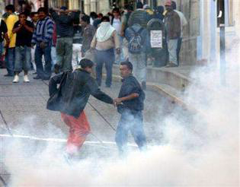
If you thought the 2005 teachers strike in British Columbian was a tough fight, consider the risks run by teachers in Oaxaca, Mexico who walked out in May 2006 to demand better conditions for themselves and their students.
Many have been beaten by police, at least 100 others have "disappeared," and their job action was brutally repressed, sparking a mass movement that has threatened to topple the local government.
Teachers in Oaxaca, which has Mexico's largest indigenous population, have a long history of militant and democratic trade unionism. Last week, the B.C. Teachers Federation head office in Vancouver played host to a special conference on Oaxaca convened by the Trinational Coalition in Defense of Public Education.
Dan Leahy, the co-ordinator of the coalition, explained that Oaxacan teachers decided to return to their jobs in October of last year but the continued threat of violence makes resuming their work "almost impossible."
"So there's ongoing interest on the part of North American teacher union leaders in, first of all, the right of teachers to strike, because when the Oaxacan teachers struck they were beaten and attacked by the Oaxacan police. So we're concerned about whether or not a right to strike still exists in reality."
"It really speaks to the power of the human spirit. You can only take so much before you rise up," said BCTF President Jinny Sims, who chaired a public forum that featured representatives of the Mexican Teachers Union.
Settlement didn't end violence
On June 14, 2006, the state government tried to forcibly evict teachers assembled in Oaxaca's central plaza. In response, the Popular Assembly of the Peoples of Oaxaca (APPO) was formed, with the goal of forcing the resignation of the unpopular state governor Ulises Ruiz Ortiz.
Jill Friedberg, an independent filmmaker who made the Seattle WTO protest documentary This Is What Democracy Looks Like, also addressed the forum, showing recent footage taken of Oaxaca's diverse social movements. Friedberg's film Granito de Arena provides an excellent backgrounder on neo-liberal globalization's impact on public education in Mexico, and on the traditions of resistance and activism by teachers.
In October, Oaxacan teachers began to return to work after a settlement was reached, but the repressive violence only escalated. On Oct. 27, independent media activist Brad Will was shot and killed while video recording events on the barricades. Oaxacans themselves, of course, have borne the brunt of the state and paramilitary violence directed against APPO. More than 200 people have "disappeared" during the unrest.
Teachers and politics
The tri-continental gathering of teachers wrapped up the weekend in Vancouver, resolving to continue to offer real solidarity to the efforts of Oaxaca's teachers and social movements. Their summary document outlined some of their priorities:
"We have agreed to continue pressuring the Mexican government to stop the repression of teachers, to free all political prisoners, to lift all arrest warrants against Oaxacan teachers, and punish those responsible for the disappearance and assassination of teachers and of the peoples of Oaxaca."
In the fall of 2005, British Columbia was polarized by a determined job action by the BCTF. After an outpouring of public support for the teachers and mobilizations by thousands of other unionized workers, Gordon Campbell and the Liberals blinked first, making some modest concessions and backtracking from declarations that they would not talk to the organizers of an "illegal strike."
To those who might argue that B.C. teachers should stay out of political issues here and abroad, Dan Leahy offers this rebuttal: "In Mexico, there is certainly a long tradition, not only of international solidarity but of the teacher being a leader in social struggle. That's part of the social standing of teachers.
"A teacher in Mexico is someone who tells what they see in the classroom to a broader community, and I think that's fundamental to the role of the teacher." ![]()














Tyee Commenting Guidelines
Comments that violate guidelines risk being deleted, and violations may result in a temporary or permanent user ban. Maintain the spirit of good conversation to stay in the discussion.
*Please note The Tyee is not a forum for spreading misinformation about COVID-19, denying its existence or minimizing its risk to public health.
Do:
Do not: